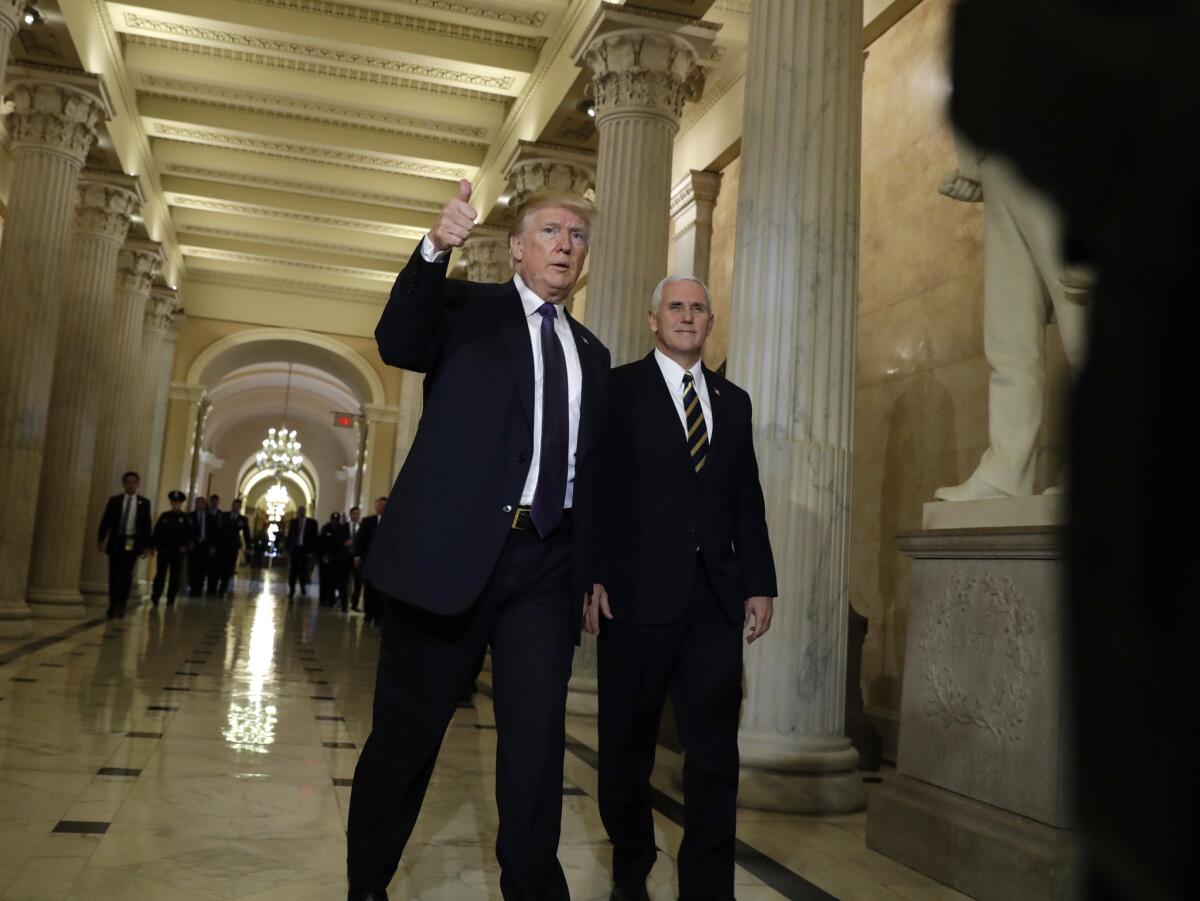Trump pushes Republicans on tax overhaul as Congress faces a busy month

- Share via
Reporting from Washington — With a renewed push from President Trump, GOP Senate leaders on Monday scrambled to revise their tax reform plan to win over skeptics ahead of this week’s crucial vote.
Several Republican senators voiced new reservations about the tax bill, a $1.5-trillion package that could become the most significant achievement of Trump’s first year in office, but has low public support among voters.
Some senators fear the bill is too heavily tilted in favor of corporations and the wealthy, and does not do enough for small-business owners or ordinary Americans.
An analysis Monday from the nonpartisan Congressional Budget Office said households with incomes of $30,000 or less would end up paying more or receive fewer federal benefits under the GOP proposal, confirming earlier assessments.
Also Monday, key Republican senators met with Trump for lunch at the White House. Afterward, they downplayed the mounting concerns but acknowledged the difficulty ahead since they can afford to lose only two votes in the Senate with their narrow 52-seat majority.
“We always have to deal with everybody, so it’s not any one particular person,” said Sen. Orrin G. Hatch (R-Utah), chairman of the Finance Committee, told reporters at the White House. “These are tough times; these are tough issues. They’re hard to deal with, and we intend to deal with them.”
Trump will head to Capitol Hill on Tuesday to meet with all GOP senators about the tax plan.
Over the weekend he called Sen. Steve Daines after the Montanan became the second GOP senator to oppose the tax overhaul, putting it at risk of defeat. Daines raised concerns similar to those of Sen. Ron Johnson (R-Wis.) over the bill’s treatment of small-business owners, who they argue do not benefit as much from the bill as corporations.
“It was good to speak with @realDonaldTrump this weekend working through these concerns,” Daines tweeted Monday.
The Senate bill follows a similar legislative structure as the measure approved by House Republicans in lowering corporate and some individual tax rates, but doing away with many popular deductions.
Johnson and other senators have suggested one way to improve the bill for so-called pass-through businesses would be to clamp down on deductions for corporations and using those savings to provide more assistance to smaller firms.
“I told the president this would be a great solution to help out these Main Street businesses in America,” Daines said Monday. “He liked the idea.”
Critics have pointed to the ability of corporations to continue to write off state and local taxes. By contrast, individuals or those filing as pass-throughs would no longer be able to do so under the House and Senate bills.
Eliminating the state and local tax deduction has been a constant source of debate in Congress because it brings in more than $1 trillion in revenue over 10 years. But eliminating the write-off would hit residents in high-tax states like California, who use it to lower their tax bills.
GOP Sen. Susan Collins of Maine prefers the House approach, which retained the local property tax deduction, capped at $10,000. She is trying to reinstate that in the Senate version of the bill.
Collins also objected to a provision that repeals the Affordable Care Act mandate that all Americans carry insurance, which the Congressional Budget Office report estimated would leave 13 million more Americans uninsured by 2027. She wants that provision offset by a separate bill that aims to help stabilize Obamacare insurance markets.
To make up for the lost revenue, senators may consider increasing the corporate tax rate, which under the bills would be reduced from 35% to 20%. Under the Senate plan, corporate cuts are permanent, but individual cuts expire in eight years.
“I am confident we’re gong to get this done soon, get it to the president’s desk,” said Sen. Patrick J. Toomey (R-Pa.) after the White House meeting.
Pushing ahead on tax reform has become tangled by other looming agenda items. Congress must reach a budget accord soon or risk a government shutdown next week, but the tax bill’s $1.5-trillion price tag has raised concerns among the Senate’s few remaining deficit hawks.
Lawmakers are also mulling over the Obamacare fix sought by Collins, a bipartisan deal that would stave off rising premiums by ensuring federal payments to insurers that are used to lower co-payments and deductibles for low-income people.
Other senators want a year-end immigration deal for young immigrants known as Dreamers, who face deportation early next year when Trump plans to end a program that allows them to stay in the country temporarily with work permits.
The tax package, though, remains the GOP’s top priority as Republicans prepare to close out the year with few other legislative accomplishments.
It got a boost Monday when Sen. Rand Paul (R-Ky.) announced he would be backing the package.
“This bill is not perfect,” Paul wrote in an op-ed on FoxNews.com. “The next few weeks in Washington will be important. Will we keep our word and cut taxes?”
ALSO
House passes its tax reform plan as Senate version comes under new attack
More coverage of politics and the White House
UPDATES:
3:25 p.m.: This article was updated with reaction after Trump’s lunch with senators.
This article was originally published at 9:10 a.m.
More to Read
Get the L.A. Times Politics newsletter
Deeply reported insights into legislation, politics and policy from Sacramento, Washington and beyond. In your inbox twice per week.
You may occasionally receive promotional content from the Los Angeles Times.











